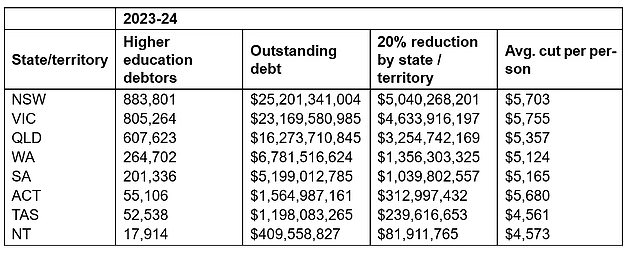-
University students will see their debts reduced by 20 percent.
-
One of Anthony Albanese’s campaign pledges was to make this promise.
-
EXPLORE FURTHER: Why Everyone Is Commenting on Albo’s Election Victory
Anthony Albanese
The government plans to reduce all student loan debts by 20%, eliminating approximately $16 billion for roughly three million Australians.
The policy, which is crucial for Albanese’s re-election bid, is scheduled to be put into action starting June this year.
As per the proposal, a graduate carrying an average student debt of $27,600 would have their loan decreased by $5,520, based on government statistics.
Tolong support kita ya,
Cukup klik ini aja: https://indonesiacrowd.com/support-bonus/
Albanese’s suggested change would cover all loans under the Higher Education Loan Program, Vocational Education and Training Student Loans, Australian Apprentice Support Loans, as well as other forms of income-contingent student debt.
‘The entire country prospers when we simplify educational accessibility for everyone. It’s all about unlocking opportunities – and making those pathways broader,’ he stated upon unveiling the initiative.
The proposed changes would increase the income threshold for repayments from $54,000 to $67,000 and decrease the repayment rate.
For an individual earning $70,000, this change will result in saving approximately $1,300 annually in repayment costs.
The education minister, Jason Clare, stated that cutting student loans will be the initial legislative item introduced by Labor once Parliament reconvenes on July 22.


“The legislation will reduce your student debt by 20 percent and make it retroactive to June 1st, prior to when indexation was implemented,” Clare explained.
This is a groundbreaking development for over three million Australians carrying a student loan burden.
The difference between the reduced repayment amounts and what tertiary institutions charge their students will be covered by taxpayer money and government borrowing.
This expands upon a $3 billion policy implemented last year, which ties student debt indexing to whichever is lower: the wage price index or the consumer price index.
If not for this intervention, students graduating might have encountered yet another significant rise, similar to what happened in 2023 when the indexing jumped to 7.1 percent — an uptick from 3.9 percent the previous year, which added $1,759 onto the typical student debt of around $24,770.
Read more




